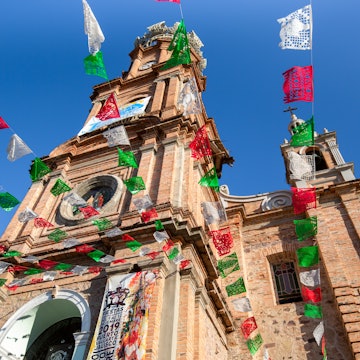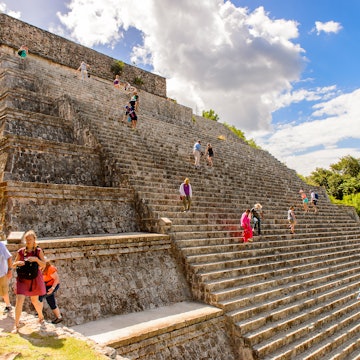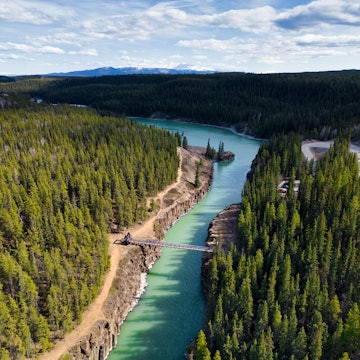

Hierva el Agua is a thermal spring in the central valleys of Oaxaca, Mexico. Belikova Oksana/Shutterstock
Mexico's beauty goes far beyond the resort strips and tourist hotspots that dominate most vacation itineraries. From surreal sculpture gardens hidden in cloud forests to crystal-clear lagoons that seem too blue to be real, this vast country rewards travelers who venture off the beaten path.
Stretching from the wine valleys of Baja California to the Maya highlands of Chiapas, Mexico offers an incredible array of landscapes and experiences. You'll find everything from car-free islands where golf carts rule the sandy streets to mineral pools perched high on cliff edges.
While big cities certainly have their charm (is there a soul out there not currently obsessed with CDMX’s leafy Roma and Condesa neighborhoods?), we decided to shine a light on smaller destinations.
Here are the most beautiful places that showcase just how diverse and captivating Mexico really is.

1. Xilitla and Las Pozas, San Luis Potosí
Best for surreal art and jungle adventures
Hidden in the cloud forests of the Sierra Madre Oriental, Las Pozas is home to one of the world's most extraordinary art installations. This 80-acre wonderland was created by eccentric British poet Edward James, who spent decades building a surrealist paradise of concrete sculptures, staircases that lead nowhere and castle-like structures that seem straight out of a dream.
You'll wander through jungle paths and sculptures that blend seamlessly with the natural environment, with orchids blooming from concrete crevices and tropical vines embracing the structures. Beyond the art, the cloud forest itself is magical, with natural pools where you can swim in crystal-clear water surrounded by exotic plants.
Make sure you visit the Leonora Carrington museum, dedicated to the British surrealist artist who was James's close friend and collaborator.
Planning tip: Visit during the dry season (November to April) when the forest paths are less muddy. Stay overnight at Posada El Castillo to continue with the surrealist theme and experience Las Pozas early in the morning, when you'll have the place largely to yourself.
2. Todos Santos, Baja California Sur
Best for bohemian charm and artistic culture
Once a sleepy fishing village, this charming town has transformed into Baja's most vibrant arts hub, attracting painters, writers and creative types from around the world. Cobblestone streets are lined with galleries, boutique hotels and excellent restaurants, while the legendary Hotel California captures the town's bohemian spirit – though whether it actually inspired the Eagles' famous song remains a topic of debate among locals and visitors alike.
Beyond the cultural scene, Todos Santos offers access to some of Baja's best Pacific beaches, including Playa Los Cerritos, a popular spot for surfing.
Wellness-focused travelers should check out Desierto Azul, a four-room retreat featuring a gluten-free bakery and a plant-based cooking studio.
Planning tip: Visit during the dry season (October to April) when temperatures are pleasant. The town hosts its Festival del Arte in February.
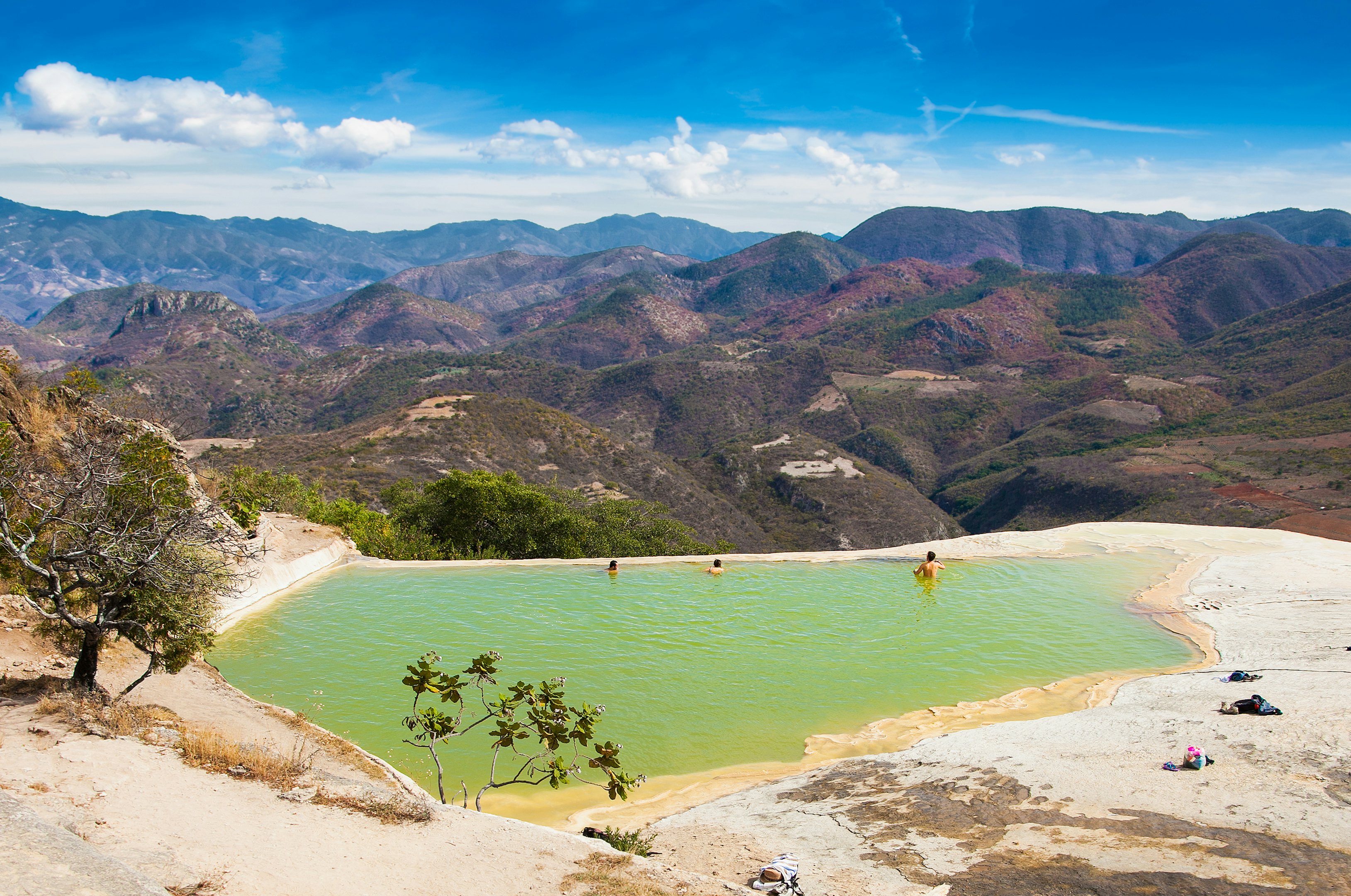
3. Hierve el Agua, Oaxaca
Best for natural wonders and photography
In Oaxaca, nature has spent thousands of years creating one of Mexico's most surreal landscapes. Mineral-rich springs have formed what looks like a frozen waterfall cascading down a cliff face – these petrified formations create dramatic white curtains against the ochre cliffs towering 200 feet above the Oaxaca Valley.
You can soak in warm mineral pools while taking in panoramic valley views. The main pool sits right at the cliff's edge, creating the illusion of an infinity pool suspended in mid-air – perfect for photos, but even more impressive in person.
The surrounding area reveals ancient Zapotec irrigation channels that are still functional after 2,500 years, showing just how advanced these civilizations were.
Planning tip: Arrive early morning or late afternoon to avoid tour bus crowds and harsh midday light. Weekdays are much more peaceful than weekends.
4. Isla Holbox, Quintana Roo
Best for a laid-back island escape
Holbox's charm lies in what it lacks: cars, big resorts and the frantic pace that's taken over much of the Riviera Maya. This 26-mile-long island remains car-free – instead, golf carts and bicycles navigate sandy streets lined with colorful Caribbean houses.
From June to September, whale sharks gather in nearby waters, giving you the chance to swim alongside the world's largest fish. After dark, bioluminescent plankton light up the water like underwater stars when disturbed – guided kayak tours take you to the best spots to see this natural light show along beaches that stretch for miles without interruption.
Book accommodations well in advance for whale shark season (June-September). Consider Ser Casasandra, an artist-conceived sanctuary focused on spiritual restoration.
Planning tip: Bring cash – ATMs are limited and many places don't take cards.

5. Palenque, Chiapas
Best for ancient Maya ruins and jungle immersion
Rising from dense rainforest, Palenque ranks among the Maya world's most spectacular archaeological sites. The Temple of Inscriptions houses the tomb of Pakal the Great, while the Palace offers panoramic views over jungle canopy alive with howler monkeys and tropical birds.
What sets Palenque apart is its jungle setting – it feels like discovering a lost city. Morning visits offer the best chance to spot wildlife, as howler monkeys announce dawn with calls that carry for miles.
Don't miss the nearby natural attractions: the cascading turquoise pools of Agua Azul and the 115-foot waterfall at Misol-Ha provide refreshing swimming spots after exploring the ruins.
Planning tip: Visit early morning when wildlife is most active and temperatures are cooler. Bring insect repellent and rain gear during the wet season (May to October).
6. Valle de Guadalupe, Baja California
Best for wine country and culinary experiences
Mexico's premier wine region spreads across rolling hills in a valley that produces over 90% of the country's wine. Boutique wineries offer intimate tastings with spectacular valley views.
The real draw here goes beyond wine – the valley has become Mexico's most exciting culinary destination. Restaurants like Olivea Farm to Table practice true farm-to-table cooking with ingredients sourced from their own organic gardens, while local spots like La Cocina de Doña Esthela serve traditional regional specialties like machaca (shredded dried beef typically served for breakfast).
Weekend visits reveal the valley's festive side, with live music at wineries and impromptu celebrations that can stretch into the evening.
Planning tip: Visit during harvest season (August to October) for the most festive atmosphere. Book restaurant reservations well in advance, especially for weekend dinners.
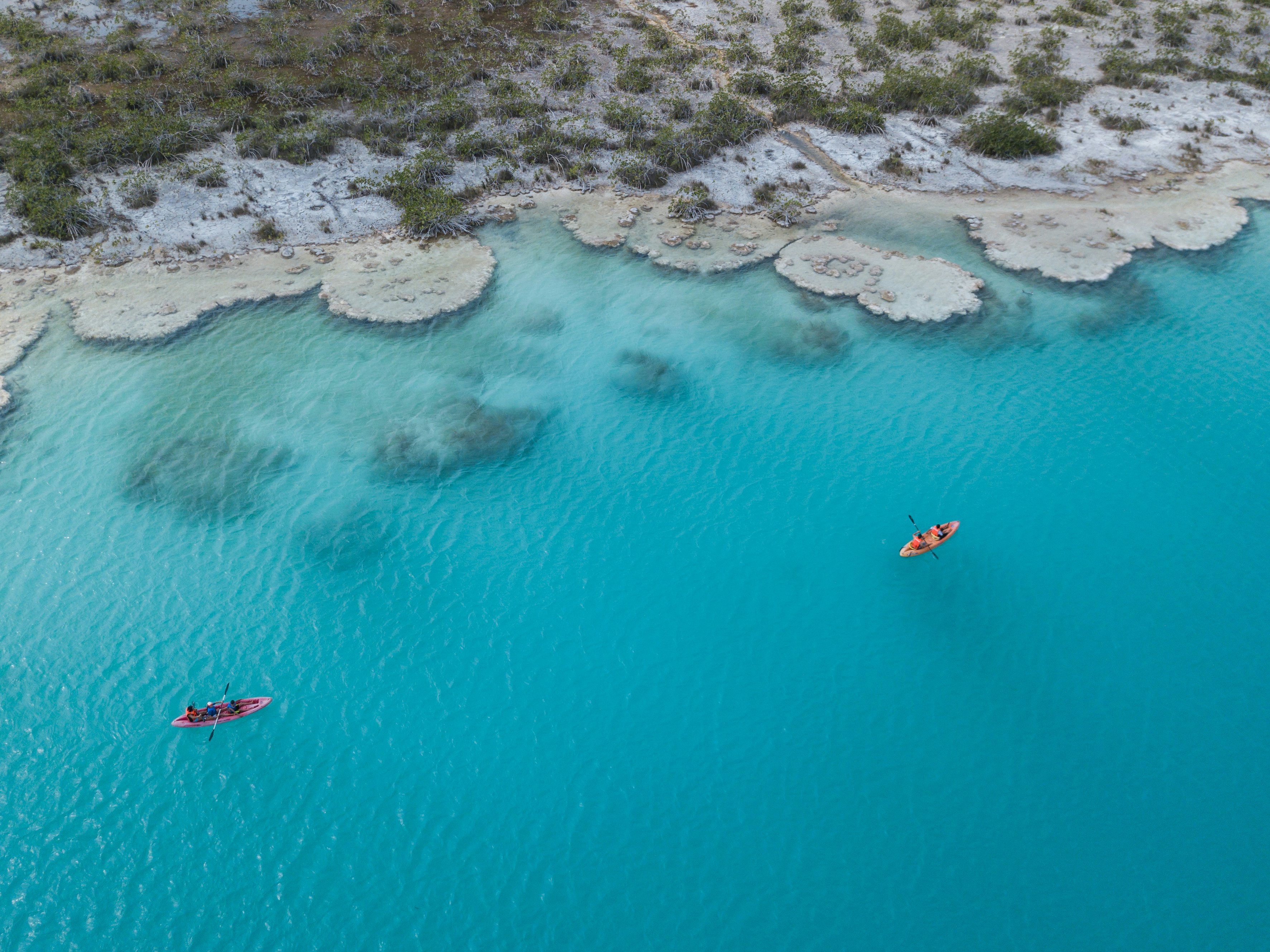
7. Laguna de Bacalar, Quintana Roo
Best for kayaking and crystal-clear waters
Known as the "Lake of Seven Colors," this 26-mile lagoon stretches through the Yucatán jungle with waters that shift from pale turquoise to deep indigo. The star attraction in Bacalar is Canal de los Piratas, where cenote springs create an otherworldly blue that seems almost artificial.
Kayaking here feels like floating through liquid sapphire – the water is so clear you can see ancient Maya pottery shards on the bottom in some areas. Cenote Azul, part of the lagoon system, plunges to depths of about 295 feet, creating a perfect circle of impossibly blue water.
Recent conservation efforts have limited motorboat access in some areas, making kayaking the ideal way to explore without disturbing the peace.
Planning tip: Visit during the dry season (November to April) when water levels are optimal. Use reef-safe sunscreen to protect the delicate ecosystem.
8. Punta Allen, Quintana Roo
Best for fly fishing and pristine wilderness
At the southern tip of Sian Ka'an Biosphere Reserve, this tiny fishing village of 500 people feels like the end of the earth – and that's exactly its appeal. It offers access to world-class fly fishing while maintaining the authentic rhythm of a traditional Mexican fishing community.
The protected waters harbor legendary populations of bonefish, tarpon and permit. Local guides (booked through your accommodation) possess intimate knowledge of the flats where these prized fish feed, passed down through generations.
The village maintains an off-grid charm with frequent power outages that encourage early bedtimes and dawn awakenings. Accommodations range from glamping at Cielo y Selva to the Grand Slam Fly Fishing Lodge, but all share the same relaxed atmosphere where conversation centers on the day's fishing and wildlife sightings.
Planning tip: Best fishing is April to July. Bring cash for everything – there are no ATMs or card payments here.
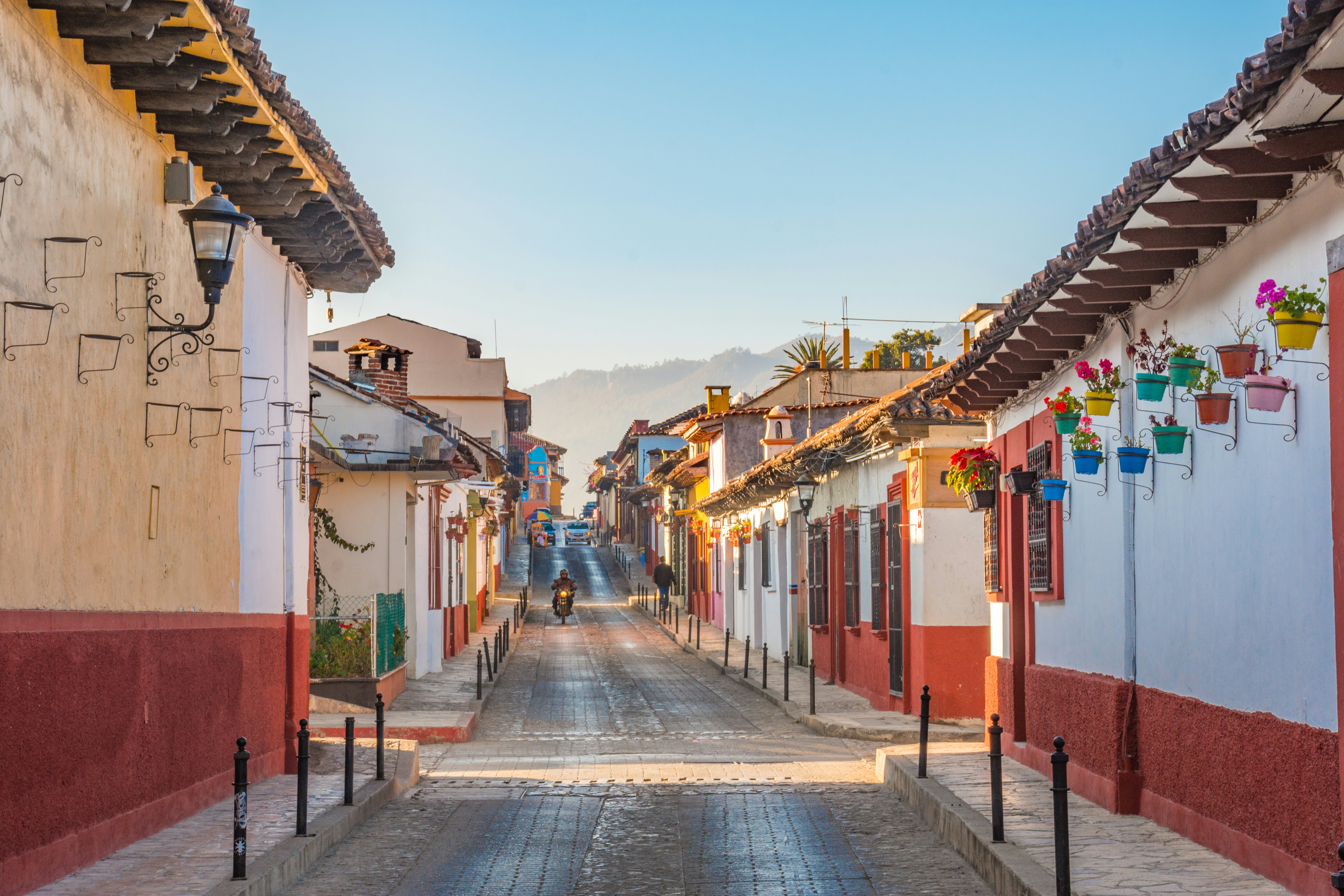
9. San Cristóbal de las Casas region, Chiapas
Best for indigenous culture and mountain village life
Nestled in a highland valley at 7,200 feet, San Cristóbal feels like a world apart from Mexico's beach destinations. This mountain town serves as the cultural heart of indigenous Chiapas, where Maya traditions thrive alongside Spanish heritage.
The Saturday market transforms the city into a riot of color, with Tzotzil and Tzeltal women selling textiles while marimba music drifts from the cathedral steps. Day trips to villages like Zinacantán and San Juan Chamula offer glimpses into living Maya culture, where ancient rituals blend with Catholic practices in fascinating ways.
If time allows, don’t miss the Lagunas de Montebello National Park, known for its 59 multi-colored lakes and surrounding pine forests – it’s a two-hour drive away near the border with Guatemala.
Planning tip: Pack warm clothes – mountain evenings can be surprisingly cool even in summer. When visiting indigenous communities, always ask permission before photographing people.
10. Isla Mujeres, Quintana Roo
Best for idyllic beaches
Just eight miles off Cancún's coast, Isla Mujeres maintains the laid-back Caribbean vibe that the mainland has largely lost to development.
Playa Norte consistently ranks among Mexico's most beautiful beaches, with shallow, crystal-clear waters and soft white sand. The island's compact size makes exploration effortless – rent a golf cart and circle the entire place in an hour.
Underwater adventures include swimming with whale sharks (June to September) and exploring the MUSA underwater sculpture museum, where over 500 life-sized sculptures create an otherworldly diving experience.
Planning tip: Stay overnight to experience the island after day-trippers return to Cancún – Ixchel Beach Hotel has ocean view rooms facing Playa Norte. Rent a golf cart early in the day, as they can sell out during peak season.








